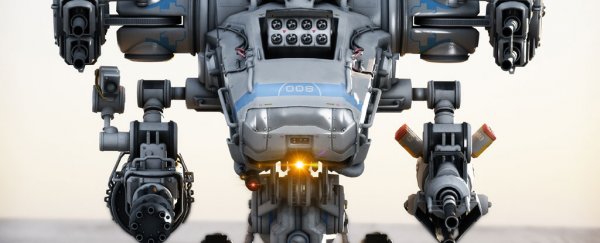Experts have previously voiced their fears of malevolent Terminator-style artificial intelligence developing sufficient smarts to pose a risk to humans in the future, but the very real dangers of robotic warfare are already becoming a problem.
Despite the best efforts of a huge coalition of scientists and tech leaders calling for a ban on the development of autonomous weapons systems, the failure of the United Nations to effectively regulate the 'killer robot' industry is already enabling the makers of dangerous technology, according to a report in The Guardian.
"There is indeed a danger now that [the process] may get stuck," said Christof Heyns, the UN special rapporteur on extrajudicial, summary or arbitrary executions, as reported by Harriet Grant. "A lot of money is going into development and people will want a return on their investment. If there is not a pre-emptive ban on the high-level autonomous weapons then once the genie is out of the bottle it will be extremely difficult to get it back in."
The concerns are being voiced amid delays by the UN to implement a pre-emptive ban on autonomous weaponry, which is enabling some countries and arms manufacturers to develop weapons during the lull.
Simultaneously, powerful nations like the US and UK are said to be watering down the proposed ban with calls for amendments designed to permit their existing autonomous weaponry to remain in play – meaning the eventual agreement would only effectively ban the development of future robotic weapons by other less advanced countries.
"The UK and US are both insisting that the wording for any mandate about autonomous weapons should discuss only emerging technologies," said Noel Sharkey, a professor of AI and robotics at the University of Sheffield in the UK and co-founder of the International Committee for Robot Arms Control.
"Ostensibly this is because there is concern that … we will want to ban some of their current defensive weapons like the Phalanx or the Iron Dome. However, if the discussions go on for several years as they seem to be doing, many of the weapons that we are concerned about will already have been developed and potentially used."
During the delay, nations are busily testing their own autonomous weapons systems, and it's not just the US and UK doing so. South Korea and Israel have already deployed semi-autonomous weapons along their borders - respectively, a sentry robot and semi-autonomous machine guns. If the idea of these things sounds terrifying, rest assured – you're not the only one who thinks so.
"We shouldn't delegate the decision to kill to a machine full stop," Sharkey told The Guardian. "Having met with the UN, the Red Cross, roboticists and many groups across civil society, we have a general agreement that these weapons could not comply with the laws of war."
